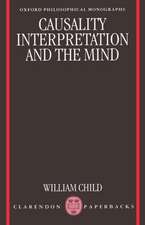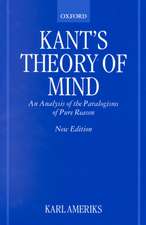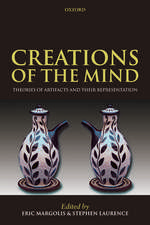Implicit Bias and Philosophy, Volume 1: Metaphysics and Epistemology
Editat de Michael Brownstein, Jennifer Saulen Limba Engleză Hardback – 31 mar 2016
Preț: 421.55 lei
Preț vechi: 579.83 lei
-27% Nou
Puncte Express: 632
Preț estimativ în valută:
80.66€ • 84.44$ • 66.74£
80.66€ • 84.44$ • 66.74£
Carte tipărită la comandă
Livrare economică 25-31 martie
Preluare comenzi: 021 569.72.76
Specificații
ISBN-13: 9780198713241
ISBN-10: 019871324X
Pagini: 328
Dimensiuni: 165 x 235 x 24 mm
Greutate: 0.62 kg
Editura: OUP OXFORD
Colecția OUP Oxford
Locul publicării:Oxford, United Kingdom
ISBN-10: 019871324X
Pagini: 328
Dimensiuni: 165 x 235 x 24 mm
Greutate: 0.62 kg
Editura: OUP OXFORD
Colecția OUP Oxford
Locul publicării:Oxford, United Kingdom
Recenzii
I hope to have shown just how relevant this book is for current discussions within social philosophy, epistemology, metaphysics, and moral psychology. Given the strong reliance on empirical literature, for example, providing alternative interpretations of existent empirical studies (as in Carole Lee's contribution), presenting empirical results themselves (as in Laura Di Bella, Eleanor Miles, and Jennifer Saul's contribution), the chapters in this book are not only interesting to philosophers but also to empirical researchers. Another strength of this book is the variety of questions it covers, ranging from a new understanding of stereotype threat (Ron Mallon's chapter) to expanding on the epistemic consequences of this phenomenon (Stacey Goguen's chapter); from the proposal that implicit biases are not mental states (Edouard Machery's chapter) to a prescription on how to pursue the ethical ideal of being unprejudiced without incurring epistemic costs (Alex Madva's chapter).
Notă biografică
Michael Brownstein is Assistant Professor of Philosophy at John Jay College/City University of New York. His research focuses on philosophy of psychology and cognitive science, with emphasis on the nature of the implicit mind. In 2014-2015 he was a Visiting Scholar at the American Academy of Arts and Sciences, a Fellow of the American Council of Learned Societies, and visiting faculty at Deep Springs College. His published articles on automaticity, spontaneity, and implicit bias have appeared in journals such as Philosophical Studies, Mind and Language, and the Stanford Encyclopedia of Philosophy. These mark a small transition from his first publication, 'The Wonderful World of Tame Reptiles', in Reptile Hobbyist.Jennifer Saul is Professor of Philosophy at the University of Sheffield and Director of the Society for Women in Philosophy UK. Her research is primarily in philosophy of language, feminist philosophy, and philosophy of race. She is the author of Lying, Misleading, and What is Said (OUP, 2012); Simple Sentences, Substitution, and Intuitions (OUP, 2007); and Feminism: Issues and Arguments (OUP, 2003). She directed the Leverhulme International Network in Implicit Bias and Philosophy (2011-2013) that gave rise to these volumes. She has also served as a consultant on a zombie movie script.

















